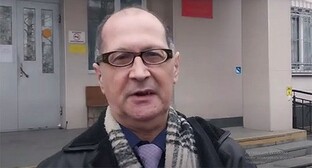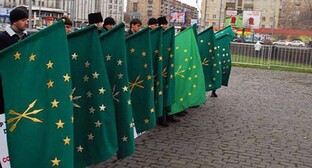25 March 2011, 23:50
Authority officials and public activists prepare report on visiting Nalchik SIZO
Representatives of power bodies and power organizations, who reacted to complaints of the defendants figuring in the case on the attack on Nalchik in 2005 and visited the SIZO (pre-trial prison), located in Nalchik, the capital of the Kabardino-Balkarian Republic (KBR), are drafting a special report based on talks with detainees and examination of their custody conditions.
The "Caucasian Knot" has reported that on March 23 a commission of state officials and public activists visited the Nalchik SIZO. The visit was caused by applications and complaints lodged by the defendants figuring in the case on the attack on Nalchik on October 13, 2005, against toughening of their custody regime starting March 4.
The defendants claimed that the special-purpose unit of Russian FSIN (Federal Punishment Service) applied physical force to several of them at convoying. In particular, on March 22, the defendant Rasul Khulamkhanov stated that he had been beaten by the convoy and cannot participate in the trial. The court session was postponed.
The toughening of the custody regime, according to the defendants, also applies to restrictions on transfer of home food to them and withdrawal from them of the materials of their criminal case. On these facts the defendants sent complaints to human rights organizations and prosecutors.
The commission, which included Vitaly Shavaev, senior assistant of the Public Prosecutor of the KBR for supervising law observance at enforcing criminal punishments; Mustafa Taukenov, adviser of the Ombudsman in the KBR; Auyes Birmamitov, assistant of the head of the FSIN Department for the KBR for observance of the law and human rights; Valery Khatazhukov, head of the Kabardino-Balkarian Human Rights Centre and a member of the public oversight commission over places of detention in Kabardino-Balkaria; and the "Caucasian Knot" correspondent, examined the cells of the new SIZO building, the catering department and meeting rooms.
The sanitary conditions and logistics of everything examined were found to be satisfactory. Most of the inmates, whom the members of the commission met in the course of the inspection, did not express any complaints about the custody conditions.
The members of the commission interviewed separately everyone who had filed a complaint.
The defendant Sergei Kaziev said that he had problems with getting food under his diet No. 5 prescribed under his illness - chronic hepatitis. The central office of the FSIN had satisfied Kaziev's complaint. He was allowed to receive foodstuffs without restrictions. However, according to the defendant, now the general limit was introduced in his relation; and his diet was rejected.
According to Kaziev, nothing was ever confiscated personally from him, no physical force was ever applied to him; however, he saw the defendant Rasul Khulamhanov come to the courtroom beaten.
Rasul Khulamhanov himself told the commission about the circumstances of his beating. According to his story, it happened in the room for searches, where the defendant was exposed to physical abuse, after he asked first to examine his clothes and then his backpack, because he "felt cold to stand naked." The defendant stated that on this occasion his advocate Kazbek Dateev filed a complaint to the Investigatory Department of the ICRF (Investigatory Committee of the Russian Federation for the KBR.
The defendant Eduard Mironov also stated that he had been beaten by the convoy. The reason, according to his story, was in his refusal to stand barefoot on the dirty floor. Besides, as he said, a number of documents and complaints disappeared from his cell.
The members of the commission also met the defendants Alim Taov, Zaur Erzhibov, Murat Midov, Aslan Berov and Rasul Kudaev. At the time of the visit of the commission, the latter was held in a solitary confinement (dungeon). Their complaints related to confiscation of the materials of the criminal case from them, cruel treatment by convoy guards (Berov also said that he was beaten), problems with obtaining medical care (they said that after 6 p.m. it is difficult to call a paramedic) and nutrition. The defendants argue that the complaints they write "never exit the SIZO."
Head of the SIZO Vladimir Popov, who works in this position since March 10, treated many inmates' complaints as groundless. According to his version, the restrictions on transfer of homemade food were introduced in the context of the order of the FSIN No. 410, according to which meat products can only be transferred in vacuum packing; or inmates can buy them at a special shop. These restrictions, as Popov explained, were introduced because of the sanitary-and-epidemiological safety.
According to one of the SIZO staff, the materials of the indictment were confiscated from the detainees under the act on prescription of the fire service. They are stored in the same building and may be provided to defendants at their request.
Besides, the managers of the SIZO said that defendants frequently break the custody regulations: prohibited items, such as cell phones, are detected on them during searches.
Author: Luiza Orazaeva Source: CK correspondent




